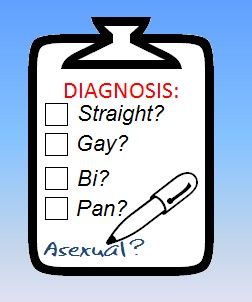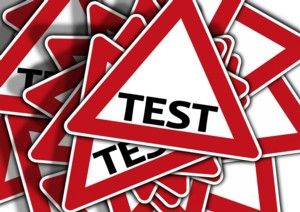Sexual Orientation
Asexuality is Not a Diagnosis
Sexual orientation is a subjective experience, not a scientific conclusion.
Posted March 3, 2015
"Well how can you know you're asexual? Have you been diagnosed?"
Believe it or not, coming out as asexual often leads to friends, acquaintances, partners, and family responding with immediate invalidation that could only, in their minds, be reversed with corroboration by a medical or psychological professional.

They believe that unlike other sexual orientations, asexuality is a diagnosis that can only be respected if we have permission from someone they would trust—implying, of course, that they do not trust us with these matters—and that it is our responsibility to "prove" that we are asexual through undergoing some sort of investigative process. Only then, say these detractors, would we be worthy of having our proclaimed orientation respected, and only then do we deserve to live our lives without being encouraged to continue looking for a different (translation: better) answer.
This may sound a bit jaded, but it is the experience of many asexual people who try to discuss their orientation with their loved ones only to be confronted with disbelief and appeal to authority. Furthermore, the folks who demand that an assisted investigation be carried out generally believe that this expectation is somehow scientific—that it is "rational" and "objective" thinking that leads them to asking for proof. Not bigotry, personal incredulity, or a knee-jerk response to being confronted with the unfamiliar.
Asexual people's belief that their experience should be considered valid is often mocked or classified as "just going on feelings," while what the detractor is asking for is framed as a reasonable request for scientific investigation. Why would we object to such a thing unless we're just afraid to face that our orientation may not meet their rigorous standards? Why are we so opposed to admitting that proof is important if we expect to be respected and believed? What do we have against science, anyway?
Here are six basic problems with unreasonable expectations from detractors who claim to be driven by "science."
1. These "scientific" objections to asexual people's orientation are virtually never levied at heterosexual people.
If this person were really insufferable enough to believe people need to experiment exhaustively or get a professional's seal of approval before they're "allowed" to use an orientation label, they would be saying the same thing to straight people who hadn't ever tested their boundaries to make sure they're not bisexual or pansexual or attracted to a type of person they've never experimented with. The people who make this argument do not demand comparable levels of experimentation from heterosexual people (on basis of their heterosexuality, though there are some groups of heterosexual people who are also invalidated and pushed to try other options for other reasons). But for asexual people, we're processed as a blank space—as not answering the question at all instead of having answered the question with "no thank you."
2. Sexual orientation isn't a science.
It is, by definition, a description of a subjective experience. Being unable to "prove" a sexual orientation does not invalidate it, and claiming a sexual orientation does not constitute a dogmatic, untested, or close-minded statement. A person does not "prove" an orientation through action (or lack thereof). It's simply the word people use to tell others what they feel. There isn't a genetic test a person can undergo to find their sexual orientation, but if a test existed that focused on markers shared by many people who identified as that orientation, it still wouldn't be dependable. Imagine if you identified as straight and you took the straight test and you failed it, yet you'd only ever experienced sexual attraction to different-gender partners. What meaning would that test have to you? Nothing.
3. Identifying as an orientation other than heterosexual generally suggests some measure of critical self-examination.
People often accuse non-heterosexual people, including asexual people, of having come to their orientation as a whim, or a trend, or the result of a cosmic shrug. They seem to have no idea at all what inner strength, anxiety, self-doubt, sleepless nights, and research can (and often does) go into accepting that you are not heterosexual. They barge into our sphere of attention opining that we can't have really thought about it enough if we came to a conclusion they don't understand or don't accept, but that position requires an incredible amount of condescension. To state that an asexual orientation automatically implies lack of having thought things through is self-important, close-minded, and ignorant.
4. Attempting to change ourselves is not easy, painless, quick, or cheap.
I can't even count the times I've been aggressively instructed to go to a therapist or undergo hormone therapy/medical testing or expand those horizons a little through experimenting with new partners. My critics seem to forget that attempting to change oneself through medical intervention, therapy, or self-led exposure therapy can be expensive, time-consuming, stressful, physically risky, and permanently damaging. And what are we promised if we're shamed and cajoled and brainwashed into believing we need some or all of these things? Oh, that's right. We'll have a chance at someone else's definition of happiness.

Considering many asexual people who find out they're not alone will frequently make reference to misery in their lives being largely caused by other people trying to change them, I'm pretty sure this is not actually about OUR happiness. The message here is that we should spend money, risk our health, endure pain, and subject ourselves repeatedly to experiences we don't intrinsically want just to make sure we couldn't be happier conforming to somebody else's ideals. And if we're not willing to do this to ourselves in the name of the scientific method, well, we don't deserve to be "believed."
5. "Scientific objections" are frequently uttered by people who don't know anything about science.
How many conversations have those of you who are out as asexual had with "it's about science" folks who had literally no clue that asexuality has been researched at all? They enter the conversation woefully ignorant about the existing research, but they are willing to openly state facts about biology and gender and sociology and psychology that aren't even close to the actual accepted science of today. Worse yet, they'll make these claims 100% convinced that their limited, outdated, misunderstood, or misleading beliefs about the world are scientific facts. Yet they are unable to name even one study they've read about asexuality—are in fact ignorant that any have taken place, and are ignorant of the academic publications on the topic—and still they try to claim the invalidating position on behalf of science. Anything we know about it is just feelings, liberal/PC agenda/SJW whinges, or woo. Amazing how often these folks tell us we don't have the research necessary to deserve their respect but they've never picked up a single paper on it.
6. Skepticism is not the practice of vocally doubting and aggressively mocking something you think is unproven.
In the name of "skepticism," I've seen absolutely horrifying displays of harassment, as if it's totally permissible to treat someone like garbage until they prove they're right (after which they just importantly identify as a skeptic to absolve themselves). Actual skepticism may involve doubting a claim's truth, but it does NOT require shaming or belittling a claimant.
Asexual people do NOT have to subject ourselves to whatever harrowing and painful experiences a critic has arbitrarily determined to be enough. There is NO reason they can't be respectful even if they privately doubt we're qualified to describe our experiences and put a label on that pattern in our lives.
And furthermore, given the patterns they display here—moving goalposts, refusing to read existing literature, expecting rigorous science from us when they don't have basic knowledge of it, frequent false equivalences, double standards for us vs. heterosexual people—it seems like what they really want out of these conversations is to make us feel silly and make us stop talking.
A real skeptic knows that the best thing to do with an untested claim is to fully understand the claim and then look at all the data. When asexual people encounter invalidation in the name of "science," they're usually talking to people who haven't done either of these things. They misrepresent the orientation as something that can be/needs to be proven through a test that doesn't exist, and they don't know anything about what modern science says about asexuality. They claim to care about truth and objectivity, but they refuse to acknowledge their agenda: silence, not science. They don't behave at all like scientists. They just cluck to themselves about how we don't respect logic or don't really want to know the truth about ourselves.
Meanwhile, many scientists, biologists, psychologists and so on are actually listening to us. Some of those professionals are asexual themselves. They understand science, and they aren't trying to use science like a weapon against us. They use it to understand us, much like we use it to understand ourselves. Make no mistake: the detractors aren't actually trying to understand us.
It's disappointingly unscientific of them, I think.




